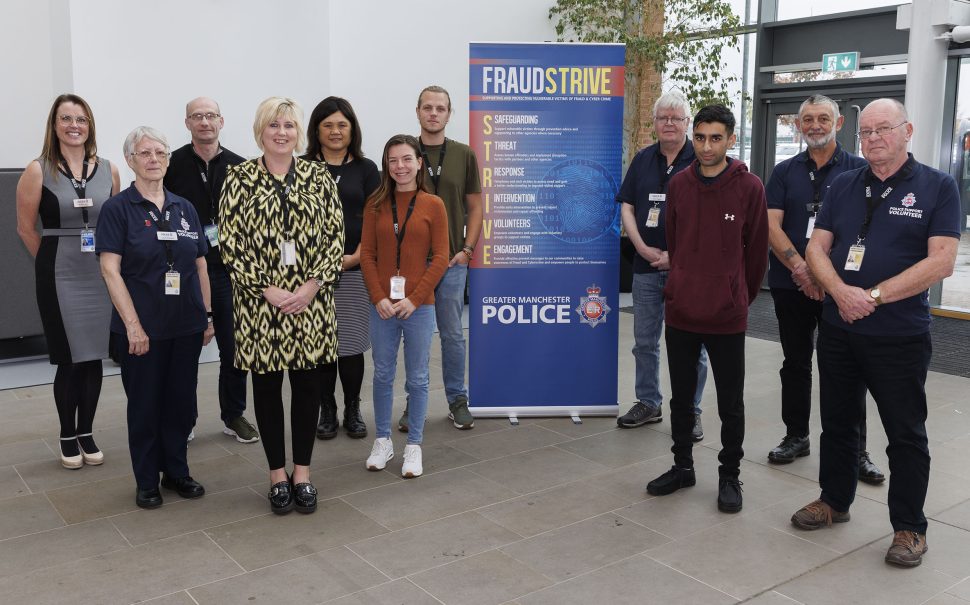In Bolton, police are working with banks to raise awareness of scams – especially at this time of year, when everyone is busy shopping online, making the most of Black Friday deals.
In the runup to the festive season, Greater Manchester Police have highlighted the importance of remaining vigilant when it comes to staying safe online.
Detective Sergeant Stacey Shannon of GMP’s Economic Crime Unit said: “The police support staff and volunteer team, which is managed by me, work together with banks and agencies to support victims of fraud.
“Anyone who has been a victim of any type of fraud, including bank and credit card fraud – we provide them with educational advice to empower them, and [explain] how they can protect themselves in future.
“Studies show that once somebody has fallen victim to bank and credit fraud, they are 60% more likely to be re-targeted by fraudsters. Our team works pro-actively with the community to assist with recovering funds and during an investigation, should it go that way.
“We do talks, pop-up stations and get out into the community around Greater Manchester. We have a pop-up station on 5 December in Bolton known as the Halifax event between 10am and 1pm to give advice to the community on how to stay safe against trends in fraud.”
Out of 909 reported incidents of bank and credit fraud between April 2022 and March 2023, 204 cases (22.4%) involved financial losses ranging from £100 to £249, making this the most common category of fraud in the data set.
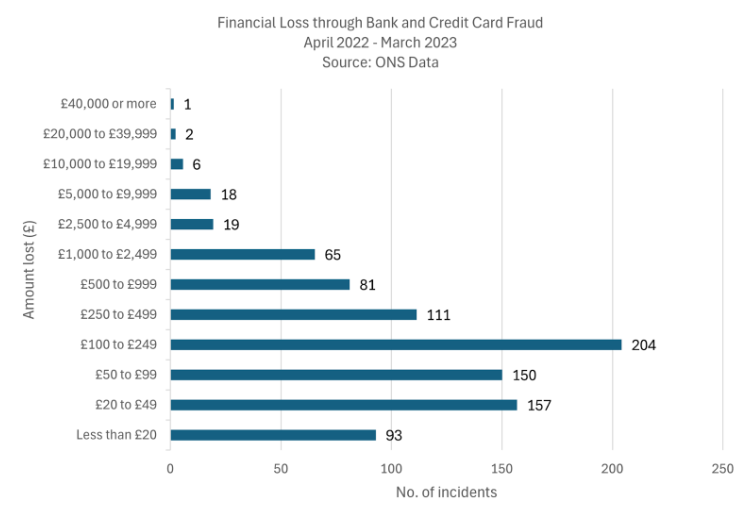
In Bolton alone, Sergeant Shannon added, victims of fraud lost over £3 million and 740 people reported their experiences to Action Fraud.
She said: “It’s a significant amount: last week alone in Bolton there were nine victims of fraud with a total value of £10,000.
“These numbers seem scary – we want to reassure the community here that we at GMP are doing everything we can to protect those victims, assisting in reporting these crimes and looking at what measures we can take to safeguard them.

“One of the main frauds we are seeing now is online shopping fraud, there were four reported victims of online shopping last week in Bolton.
“Telephone related fraud is also becoming more prevalent: there were four victims of phone fraud in Bolton last week alone.”
Whilst fraud can happen to any person of any age group, Sergeant Shannon notes there are three age categories that are most vulnerable to fraud: over 65, under 18s and, surprisingly, an increasing demographic aged 30–40 years.
“We think those aged 30–40 are becoming more susceptible to fraud because they’re increasingly going online. People have busy lifestyles – if a fraudster catches you at a vulnerable moment in your life, that’s when people become susceptible.”
It’s something, unfortunately, I am all too familiar with having been scammed over £4,000 as a university student during the busy exam period over the phone. The voice on the phone, worryingly enough, knew confidential information that is usually retained by just the bank.
For a long time, I was embarrassed to tell my family, friends and peers about the situation as I didn’t understand how I could’ve been so susceptible.
I’m not alone: the ONS data shows that the majority of those who had experienced fraud reported feeling annoyance, anger, shock and even anxiety or panic attacks as a result of their experience.
For 13% of respondents, the experience caused more long-lasting anxiety and panic attacks. A total of 4% also described experiencing symptoms of depression as a result of being frauded.
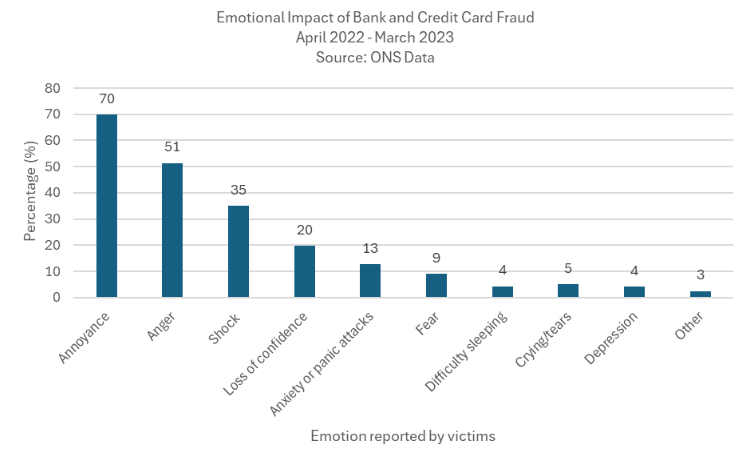
Scammers use a specific sense of urgency to force victims to comply with demands by creating a sense of panic and discomfort, Sergeant Shannon said: “There’s always an urgency with fraudsters to create a sense of unease in their victim.
“Some have reported getting text messages pretending to be their kid, [saying] that they have lost their phone and need money urgently.
“We’re also seeing an increase in online shopping frauds. People order high-value goods, and when it arrives it’s a fake product – or they just don’t receive the product at all.
“It’s pretending to be a person or business that they’re not and exploiting people at their most vulnerable.
“Once the information is extracted and compromised, it is likely passed between organised crime groups. But the funding doesn’t necessarily always go to that fraudster – they could even just be a mule.
“The stolen money can go towards all sorts of things. It could go towards funding terrorism, organised crime groups, drugs or offensive weapons.”
Figures from UK Finance’s latest Half Year Fraud report show that in the first half of 2024 over £570 million was stolen in payment fraud, a 1.5% fall from the first half of 2023. Despite this, fraud is still the most common crime in the UK.
Just last month, the government proposed new regulations that will give banks the power to pause payments for up to four days to give them more time to investigate fraud. The legislation came into effect at the end of October.
Banks are constantly fighting against fraud and prevented £710.9 million of unauthorised fraud through advanced security systems in the first half of the year.
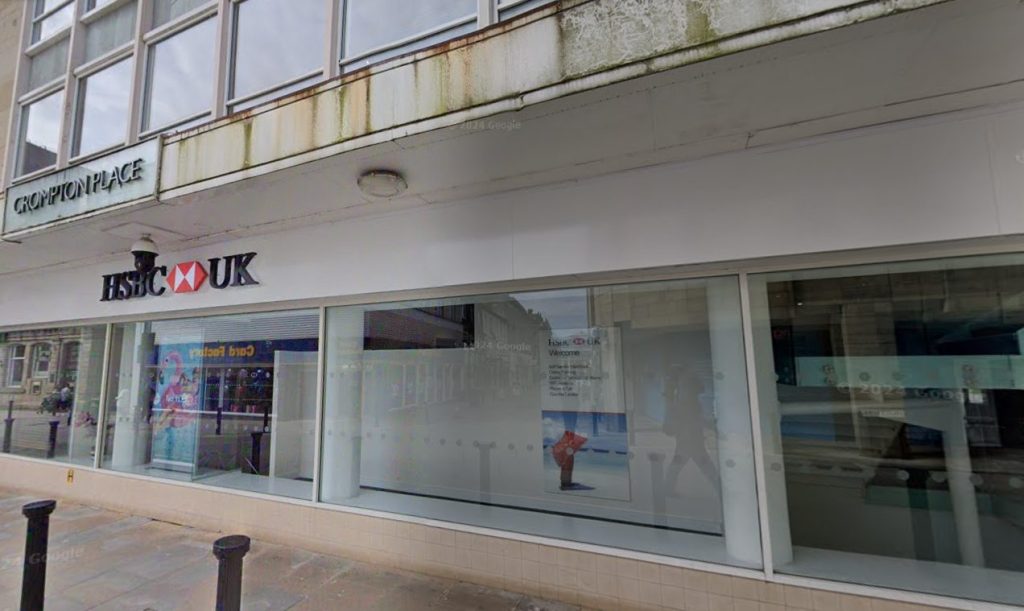
A spokesperson from HSBC said: “HSBC UK data shows that, in the first two weeks of November, there were four times as many purchase scams reported to the bank than any other type of scam.
“Purchase scams are when a customer pays for an item or service which does not materialise, and their money is lost.
“Many Black Friday sales began at the start of the month and fraudsters have been exploiting those seeking genuine bargains with ‘deals that don’t exist.
“During the same period, the average loss to a purchase scam was £426. Individual losses range from as little as £10 for phony nail bookings to much larger amounts for non-existent items like washing machines, tickets and cars.”
Whilst HSBC maintains that fraud is still the most common crime in the UK, interestingly, the median loss through bank and credit card fraud decreased by 65% between 2020 and 2023.
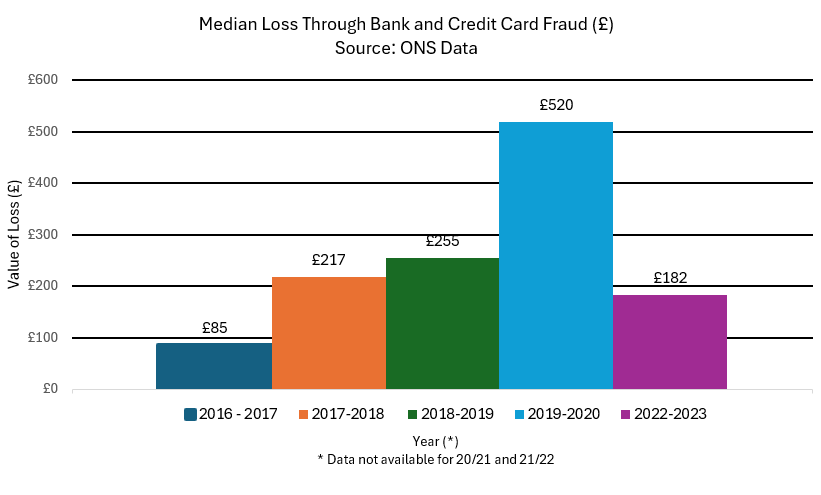
The perceived drop could be due to the COVID-19 pandemic, experts note. A statement from UK Finance notes that “criminals used the Covid-19 pandemic to target victims online, through impersonation scams, romance fraud and investment scams.”
“Almost £7 in every £10 of attempted unauthorised fraud was blocked by the banking industry last year. Unauthorised fraud fell by five per cent to £783.8 million in 2020, with the banking industry stopping £1.6 billion of losses.”
Yet despite the drop in median loss, the threat of fraudsters is still rife – especially during the festive period.
David Callington, HSBC UK’s Head of Fraud, said: “Sadly, we’ve seen fraudsters getting a head start on Black Friday, and we’ve had hundreds of purchase scams reported to us already this month.
“My fear is that they’ll be getting a bumper payday on Black Friday and over the weekend, funded by the hard-earned cash of unsuspecting shoppers.
“These fraudsters do not give their victims a second thought. They have no sympathy for families struggling with the cost of living or for those whose Christmas is ruined by their despicable actions.
“The average victim loses hundreds of pounds to these scams, which for many people is equal to the majority of their monthly rent or mortgage repayment, money they simply can’t afford to be without.
“I would urge those seeking a Black Friday bargain this year to be on the lookout for signs that what appears to be an extraordinary deal is, in fact, a scam.
“There are simple things you can do to protect yourself, such as researching retailers and using safe ways to pay such as debit or credit cards.”
Bolton has seen several high-profile fraud cases in recent years, connected to both benefits payments and to other institutions.
MP for Bolton West Phil Brickell said: “We need to get tougher on those who exploit the system.

“Tackling financial crime and fraud is personal to me. I spent over a decade in the private sector and before I became an MP I was Head of Anti-Corruption for a major high street bank.
“This is not about targeting genuine claimants or trying to trip honest people up. The public purse loses billions to targeted and organised fraud taking advantage of our system.
“Trust in the system is very important and we must protect our welfare benefits for those who genuinely need it.”
This article was also posted to The Bolton News website.
Feature image: Sergeant Shannon (third from left) with the GMP volunteers (Source: Greater Manchester Police / Press Release)
